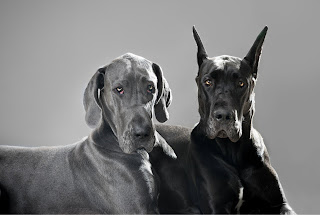Dog blog 17 - Semicolons
 Semicolons
Semicolons
The Dog has been spending a long sojourn in his bed with his squeaky toys (Dog blog 10 - plugging in); contemplating winter, and exercise. Spring however, like Dave here with his favourite ball, has finally sprung.
In doing his own springings, and writing that first sentence, the Dog thought he'd better have a quick check about when it's OK to use a semicolon.
Sniffy nose; and things
Semicolons fascinate me, and I like to keep my big sniffy nose out for them when I'm doing my readings.
Apparently the ancient Greeks used them as question marks - and they started to be used in English around the 16th Century. Shakespeare used them a bit, but they didn't really catch on till the 17th Century. My copy of the 3rd Edition of Fowler's Modern English Usage tells me that the name "semicolon" was first recorded in English in 1644; by which time, folk, and Dogs, were getting a bit carried away. Then the craze was for dashes apparently. For a short interesting history, have a look at a fun little article by Paul Collins.
Tricky
Using semicolons can be a bit tricky. The Dog mainly uses them for separating closely connected clauses. As in, "Dave gave one of his woofy sighs; he was a bit bored.". You also see them in lists, and Americans in particular like to use use them like a "big comma" (more on that below). Here's Carol Courtwright explaining when she thinks you're supposed to use them:
Semicolons and proper grammar, like.
I find the social attitudes to punctuation interesting. Particularly because I think they're slightly different to the attitudes to grammar.
Take grammar, Black English Vernacular (or "BEV") for example, which is a dialect of English. It's looked down upon by non-dialect English speakers (i.e. "pure" English speakers) as ungrammatical. But it's actually entirely grammatical, in terms of the deeper structure rules it obeys. One of the theories of one of the Dog's faves, Steven Pinker, is that our brains are geared to create language. We have, in the title of one of his books, a language instinct. So as children learn BEV from their parents, the children's brains do all the necessary sorting and grammarings. Here's a bit from Steven on how our brains approach thought.
Why do some speakers of pure English look down on BEV? For many different reasons. Some might be labelled "cultural" (a perceived an eroding of the pure language), or "protectionist" or racist. And, I think many are to an extend guilty of a lack of understanding about the deeper structure of language; about the way we process and learn it.
But I think the attitudes towards punctuation are bit different. Punctuation obeys the rules we set down for it, socially constructed and preserved by our education and printing systems. And they're completely made up (you'll remember they started out life as question marks): I doubt there is a "semicolon instinct".
The key difference with grammar, I think, is that the dislike of semicolons is a kind of inverted snobbery. Take writer Kurt Vonnegut, who once said, “never use semi-colons. What are they good for? What are you supposed to do with them? You’re reading along, and then suddenly, there it is. What does it mean? All semi-colons do is suggest you’ve been to college.”.
And because they are so much more an artificially constructed practice, versus grammar, social attitudes will be more prevalent in determining whether semicolons will survive.
Semicolons are alive; for now.
From what my friend Mr Google tells me, there's quite a fondness out there for semicolons. There's a lot of stuff about them on the web. And proper fans too:
Bonkers.
I've kept hold of a nice story from the New York Times. Neil Neches, a worker for the New York Subway, was commended for his use of the semicolon in the placard he wrote. Neil said, "Please put it in a trash can; that's good news for everyone". Nice. (Though I have, until now, privately wondered whether he might have used a colon instead.)
And some very prominent folks still use them. Have a look at anything written by Barack Obama. He uses them a lot. American Dogs particularly like to use them for prosodic (the Dog's favourite new word) purposes. Like you're doing your speakings, and you're being instructed to take a breath. Or in a less fancy way of speaking, like a "big comma".
So are semicolons dying out? Just like their early days, I suspect they'll go in and out of fashion for a while. But I think they'll gradually die out from their original use, and survive instead as winks in "emoticons". Like Dave puts in at the end of one of his text messages when he says:
"someone has stolen the cake from the table ; )" .
Meaning of course, Dave. Which reminds me, I'd better scoot; Dave is outside, together with owner and favourite ball. Rabbit chasing beckons... .



Comments
Post a Comment